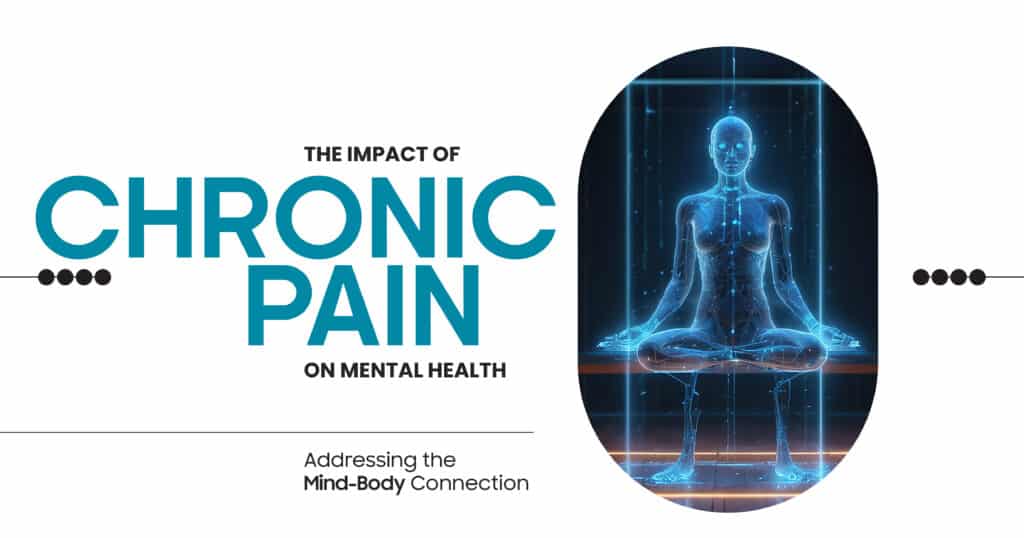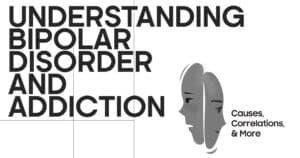Chronic pain is a pervasive and often debilitating condition that affects millions of people worldwide. Unlike acute pain, which serves as a warning sign of injury or illness, chronic pain persists for months or even years, continuing long after the initial cause has resolved.
Essential Takeaways
- Chronic Pain Impacts Mental Health: Chronic pain is strongly linked to mental health issues like depression and anxiety. Addressing both aspects is crucial for overall well-being.
- Comprehensive Management Approach: Effective management involves medical treatment, therapy, lifestyle changes, and support systems to improve quality of life.
- Utilize Support and Resources: Leveraging community resources, support groups, and professional help is vital for navigating the challenges of chronic pain and mental health.
This ongoing discomfort doesn’t just affect the body—it profoundly impacts mental health as well. Understanding the intricate relationship between chronic pain and mental health can help those affected navigate their challenges and seek effective solutions.
Understanding Chronic Pain and Its Scope
What is Chronic Pain?
Prevalence and Statistics
Chronic pain is defined as pain that lasts beyond the usual recovery period, typically more than three to six months. Unlike acute pain, which is a direct response to an injury or illness and usually resolves with healing, chronic pain persists and can continue without a clear cause. It may arise from conditions such as arthritis, fibromyalgia, or nerve damage, or it may exist without a detectable physical problem.
Chronic pain is a widespread issue, affecting an estimated 20% of adults globally. In the United States alone, over 50 million people suffer from chronic pain, making it one of the most common reasons for seeking medical care. The prevalence underscores the importance of understanding and addressing the impact of chronic pain on mental health.
How Chronic Pain Affects Mental Health
The relationship between chronic pain and mental health is complex and reciprocal. Chronic pain can lead to various psychological issues, including depression, anxiety, and stress. Studies show that individuals with chronic pain are significantly more likely to experience these mental health conditions compared to those without pain.
For instance, research has indicated that up to 50% of individuals with chronic pain also suffer from depression. The constant strain of living with pain can erode one’s sense of well-being, leading to feelings of hopelessness and worthlessness. Anxiety often accompanies chronic pain as individuals worry about their health, the potential for worsening pain, and the impact on their daily lives.
The Cycle of Pain and Mental Health
The interaction between chronic pain and mental health creates a vicious cycle. Pain can worsen mental health symptoms, while mental health issues can exacerbate the perception and intensity of pain. This cycle can make managing both pain and mental health extremely challenging.
For example, depression can reduce a person’s ability to cope with pain, leading to a heightened perception of discomfort. Conversely, the ongoing stress and anxiety caused by chronic pain can increase muscle tension, which can amplify pain symptoms. Understanding this cycle is crucial for developing effective treatment strategies.
Strategies for Managing Chronic Pain and Mental Health
Medical and Therapeutic Approaches
Addressing both chronic pain and its mental health effects often requires a multi-faceted approach. Medical treatments typically include medications to manage pain, such as non-steroidal anti-inflammatory drugs (NSAIDs), opioids, or other pain relievers. However, these medications may not always be sufficient or have side effects, making additional therapies essential.
Therapeutic Approaches:
- Cognitive Behavioral Therapy (CBT): CBT is a type of psychotherapy that helps individuals change negative thought patterns and behaviors associated with chronic pain. It focuses on teaching coping strategies, relaxation techniques, and how to manage pain-related stress.
- Dialectical Behavior Therapy (DBT): DBT combines cognitive-behavioral techniques with mindfulness strategies. It is particularly effective for individuals who experience intense emotional responses to chronic pain.
- Mindfulness and Relaxation Techniques: Mindfulness practices, such as meditation and deep breathing exercises, can help manage pain by promoting relaxation and reducing stress.
Lifestyle Changes and Self-Care
In addition to medical and therapeutic interventions, lifestyle changes play a significant role in managing chronic pain and its mental health effects. Here are some key strategies:
- Exercise: Regular physical activity can improve mood, increase energy levels, and reduce pain. Low-impact exercises like swimming or walking are often recommended for individuals with chronic pain.
- Diet: A balanced diet rich in anti-inflammatory foods, such as fruits, vegetables, and omega-3 fatty acids, can help manage pain and support overall health.
- Sleep: Quality sleep is essential for both pain management and mental health. Establishing a regular sleep routine and creating a comfortable environment can improve sleep quality.
- Self-Care: Engaging in activities that bring joy and relaxation, such as hobbies or social interactions, can help alleviate the emotional burden of chronic pain.
Support Systems and Resources
Support systems play a crucial role in managing chronic pain and its mental health effects. Building a network of supportive family members, friends, and peers can provide emotional support and practical assistance.
Support Groups: Joining a support group for individuals with chronic pain can offer a sense of community and shared experience. These groups can provide valuable coping strategies, encouragement, and a safe space to discuss challenges.
Counseling: Professional counseling can help individuals address the emotional impact of chronic pain. Therapists can provide tools for managing stress, improving coping skills, and navigating the complexities of living with chronic pain.
Community Resources: Many communities offer resources such as pain management clinics, educational programs, and advocacy organizations. These resources can provide additional support and information on managing chronic pain and improving mental health.
Working with Healthcare Providers
Integrative Care Models
An integrative care model involves a team of healthcare professionals working together to address both physical and mental health needs. This model may include primary care physicians, pain specialists, mental health professionals, and physical therapists.
Effective Communication with Providers
Effective communication with healthcare providers is essential for managing chronic pain and mental health. Here are some tips for fostering a productive relationship with your healthcare team:
- Be Open and Honest: Openly share your symptoms, concerns, and feelings with your providers. This transparency helps them understand your situation and tailor treatment plans accordingly.
- Ask Questions: Don’t hesitate to ask questions about your diagnosis, treatment options, and potential side effects. Understanding your treatment plan can help you make informed decisions and manage your condition more effectively.
- Follow Up Regularly: Regular follow-up appointments allow your healthcare team to monitor your progress, adjust treatment plans, and address new concerns.
Moving Forward with Hope and Resources
Chronic pain and its impact on mental health can be challenging, but with the right strategies and support, it is possible to improve your quality of life. By understanding the mind-body connection, seeking appropriate treatment, and utilizing available resources, you can navigate the complexities of chronic pain and enhance your overall well-being.
If you or someone you know is struggling with chronic pain and its impact on mental health, don’t wait—take action today. Connect with healthcare professionals, explore treatment options, and tap into available resources. Your journey toward better pain management and mental well-being starts now.
FAQs
1. How does chronic pain affect mental health? Chronic pain can lead to mental health issues like depression and anxiety. The ongoing discomfort impacts daily life and emotional well-being, creating a cycle where pain and mental health problems worsen each other.
2. What impact does chronic pain have on sleep, and how can it be managed? Chronic pain can disrupt sleep by making it hard to find a comfortable position or causing frequent awakenings. Improving sleep can involve setting a regular sleep schedule, creating a comfortable sleep environment, and discussing treatment options with your healthcare provider.
3. What are effective coping strategies for chronic pain and mental health? Combining medical treatments, therapeutic approaches (like CBT), lifestyle changes (such as exercise and a balanced diet), and building a support network are key to managing chronic pain and mental health effectively.
4. How should I communicate with my healthcare provider about chronic pain and mental health? Be open and detailed about your symptoms and their impact on your life. Ask specific questions about treatment options and follow-up regularly to monitor progress and adjust your plan as needed.
5. Are there community resources for chronic pain and mental health support? Yes, there are pain management clinics, support groups, educational programs, and advocacy organizations that offer valuable resources and emotional support for managing chronic pain and mental health issues













